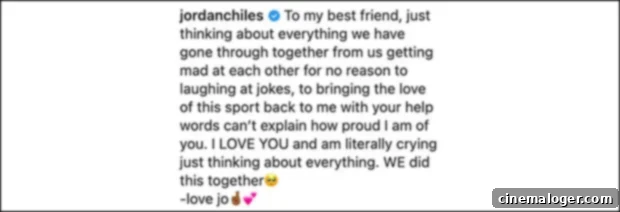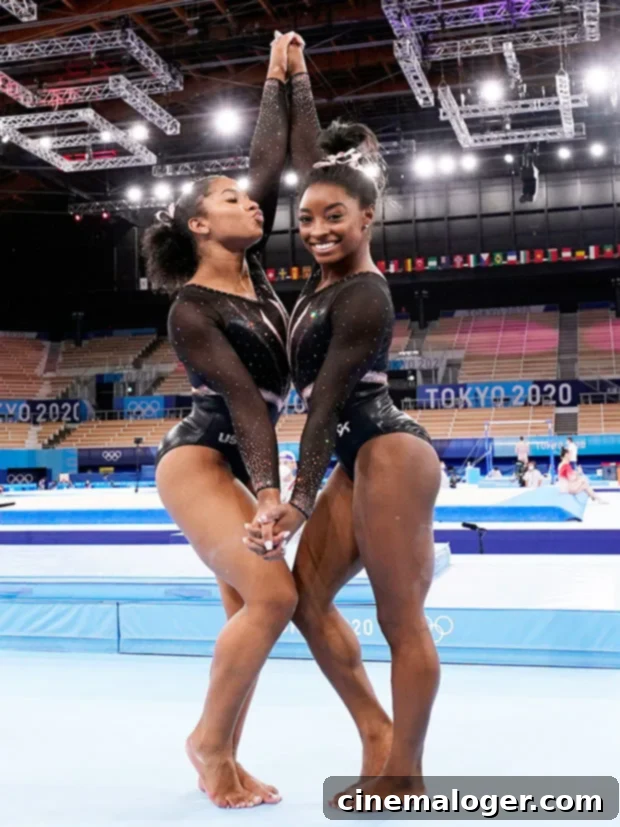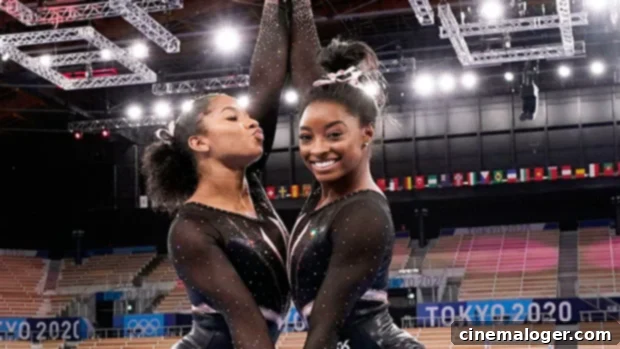Simone Biles’ Courageous Stand: Jordan Chiles’ Heartfelt Support and the Global Impact of Prioritizing Mental Health at the Tokyo Olympics
The Tokyo 2020 Olympic Games, held under unprecedented circumstances, became a pivotal moment not just for athletic achievement but also for the critical conversation surrounding athlete well-being. Amidst the intense global spotlight, gymnastics superstar Simone Biles, widely regarded as the greatest of all time, made a monumental decision that sent ripples across the world: prioritizing her mental health over the immense pressure to compete. In the wake of this courageous move, her teammate and close friend, Jordan Chiles, offered an incredibly moving message of support, highlighting the deep bond that often forms between elite athletes facing shared challenges.
“To my best friend, just thinking about everything we have gone through together from us getting mad at each other for no reason to laughing at jokes, to bringing the love of this sport back to me with your help words can’t explain how proud I am of you. I LOVE YOU and am literally crying just thinking about everything. WE did this together,” Jordan Chiles, 20, penned in a deeply personal message to Simone Biles, 24, via Instagram on July 28. This powerful declaration of friendship and solidarity came at a crucial time, underscoring the profound connection between the two gymnasts. Chiles’ words painted a vivid picture of their shared journey, not just as teammates striving for Olympic glory, but as individuals navigating the intense world of elite sports, supporting each other through laughter and conflict, and ultimately, inspiring one another to find passion in their demanding craft. Her emphasis on “WE did this together” resonated deeply, acknowledging the collective effort and the unspoken understanding that binds athletes who train tirelessly side-by-side for years.

Simone Biles later responded to Jordan’s emotional post with a simple yet heartfelt comment, “Love you… so happy for you!!!!!!!” This brief exchange between two of the world’s most talented gymnasts highlighted the raw emotion and genuine affection underpinning their competitive relationship. Jordan’s message wasn’t just a casual remark; it was a direct response to Simone’s difficult decision to withdraw from the individual all-around competition at the Tokyo Olympics. This withdrawal was explicitly made to allow Simone to “focus on her mental health,” a phrase that would soon become a rallying cry for athlete well-being across the globe.
The official confirmation of Simone’s withdrawal from the highly anticipated individual all-around competition came from USA Gymnastics in the early hours of July 28. Their statement not only supported Biles but also set a new standard for how sports organizations should address athlete mental health: “After further medical evaluation, Simone Biles has withdrawn from the final individual all-around competition at the Tokyo Olympic Games, in order to focus on her mental health. Simone will continue to be evaluated daily to determine whether or not to participate in next week’s individual event finals. Jade Carey, who had the ninth-highest score in qualifications, will participate in her place in the all-around. We wholeheartedly support Simone’s decision and applaud her bravery in prioritizing her well-being. Her courage shows, yet again, why she is a role model for so many.” This statement was crucial because it legitimized Simone’s decision, acknowledging the profound pressure and the importance of mental well-being in an arena where physical prowess is often seen as the sole determinant of success. It also ensured that the Olympic dream would continue for another deserving athlete, Jade Carey, who stepped in to compete.
Simone’s decision to step back from the individual all-around followed her earlier, equally impactful withdrawal from the women’s gymnastics team finals on July 27, also citing mental health concerns. In a remarkable display of composure and resilience, Jordan Chiles stepped in for Simone on both the uneven bars and balance beam during the team competition. This impromptu substitution was a testament to Chiles’ readiness and adaptability, but more importantly, it was a poignant demonstration of teamwork and unwavering support in a high-pressure environment. Jordan’s performance, executed with grace and determination, helped secure a silver medal for Team USA, transforming a potentially devastating setback into a moment of collective triumph and solidarity.
During a subsequent press conference, Simone Biles bravely articulated the reasons behind her withdrawal, offering a rare glimpse into the immense mental fortitude required to compete at the Olympic level and the breaking point even the strongest athletes can reach. “After the performance that I did [on the vault], I didn’t want to go into the other events, so I thought I would take a step back,” Simone explained, her voice steady but her vulnerability evident. She further revealed that she had been actively seeing a therapist, underscoring the proactive steps she was taking to manage her mental well-being. “I have to focus on my mental health and not jeopardize my health and well-being,” she stated, a powerful declaration that resonated with countless individuals globally, far beyond the confines of elite sports. This moment crystallized the understanding that even a superhuman athlete like Biles is susceptible to the same mental pressures and struggles that affect everyday people, and that seeking help is a sign of strength, not weakness.
Biles elaborated on her philosophy, highlighting a perspective often overshadowed by the relentless pursuit of perfection in sports: “There’s more to life than just gymnastics… It’s very unfortunate that it has to happen at this stage because I definitely wanted this Olympics to go a little better, but again, we’ll take it one day at a time and we’re going to see how the rest goes. Physically, I feel good. I’m in shape. Emotionally, that kind of varies on the time and moment.” Her words offered profound insight into the human element of elite competition. By acknowledging that her emotional state fluctuated despite her physical readiness, she dismantled the myth of the invincible athlete, paving the way for a more honest and compassionate dialogue about the multifaceted challenges faced by those at the pinnacle of their sport. This honest reflection provided comfort and validation to many, normalizing the concept of mental health struggles even under the brightest lights.
Simone Biles’ decisions at the Tokyo Olympics sparked a global conversation about mental health in sports, shifting the narrative from solely focusing on physical performance and medals to encompassing the holistic well-being of athletes. Her courage to step away, despite the immense pressure and the expectations of millions, served as a powerful example for athletes and non-athletes alike. Public figures, fellow Olympians, and fans from around the world lauded her bravery, emphasizing that her impact transcended gymnastics. It became a testament to the idea that true strength lies not just in enduring pain, but in acknowledging one’s limits and advocating for one’s own health. This watershed moment inspired countless individuals to speak more openly about their own struggles and to prioritize self-care, even when it means making difficult choices.

Despite her withdrawal from the individual all-around and team finals, the 4-time Olympic gold medalist remained scheduled to compete in several apparatus finals in the subsequent days. These specialized finals allowed gymnasts to focus on a single event, potentially alleviating some of the all-around pressure. The events included the vault, uneven bars, women’s floor routine, and the balance beam. These highly anticipated finals were set to begin on August 1, keeping the world on edge, eager to see if Simone would return to the Olympic stage on her own terms, continuing her journey with a renewed focus on self-preservation and enjoyment. Her potential return to any of these events was seen not just as a chance for more medals, but as a symbolic victory for her personal battle, showcasing her resilience and determination.
The story of Simone Biles and Jordan Chiles at the Tokyo Olympics is a profound narrative of friendship, courage, and the evolving understanding of mental health in elite sports. Jordan’s heartfelt message was more than just words of encouragement; it was an affirmation of a bond forged through years of shared dreams and challenges, demonstrating the power of genuine support when it matters most. Simone Biles’ decision, while difficult, cemented her legacy as a trailblazer who dared to put her well-being first, inspiring a global shift in how we perceive and address the pressures faced by athletes. It highlighted that true greatness extends beyond medals and records, residing also in the bravery to be vulnerable and to advocate for oneself, ultimately becoming a powerful role model for generations to come.
